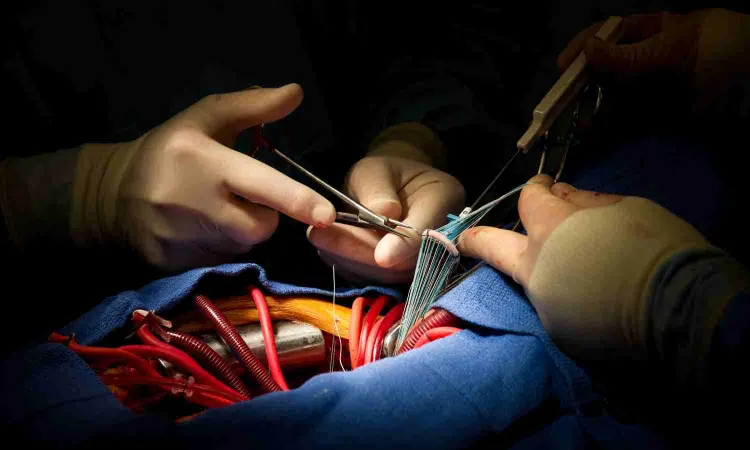- Home
- Medical news & Guidelines
- Anesthesiology
- Cardiology and CTVS
- Critical Care
- Dentistry
- Dermatology
- Diabetes and Endocrinology
- ENT
- Gastroenterology
- Medicine
- Nephrology
- Neurology
- Obstretics-Gynaecology
- Oncology
- Ophthalmology
- Orthopaedics
- Pediatrics-Neonatology
- Psychiatry
- Pulmonology
- Radiology
- Surgery
- Urology
- Laboratory Medicine
- Diet
- Nursing
- Paramedical
- Physiotherapy
- Health news
- Fact Check
- Bone Health Fact Check
- Brain Health Fact Check
- Cancer Related Fact Check
- Child Care Fact Check
- Dental and oral health fact check
- Diabetes and metabolic health fact check
- Diet and Nutrition Fact Check
- Eye and ENT Care Fact Check
- Fitness fact check
- Gut health fact check
- Heart health fact check
- Kidney health fact check
- Medical education fact check
- Men's health fact check
- Respiratory fact check
- Skin and hair care fact check
- Vaccine and Immunization fact check
- Women's health fact check
- AYUSH
- State News
- Andaman and Nicobar Islands
- Andhra Pradesh
- Arunachal Pradesh
- Assam
- Bihar
- Chandigarh
- Chattisgarh
- Dadra and Nagar Haveli
- Daman and Diu
- Delhi
- Goa
- Gujarat
- Haryana
- Himachal Pradesh
- Jammu & Kashmir
- Jharkhand
- Karnataka
- Kerala
- Ladakh
- Lakshadweep
- Madhya Pradesh
- Maharashtra
- Manipur
- Meghalaya
- Mizoram
- Nagaland
- Odisha
- Puducherry
- Punjab
- Rajasthan
- Sikkim
- Tamil Nadu
- Telangana
- Tripura
- Uttar Pradesh
- Uttrakhand
- West Bengal
- Medical Education
- Industry
TAVI Promising in High-Risk Aortic Regurgitation Patients reveals Revolutionary Study

USA: In a groundbreaking development for cardiovascular medicine, the results of the ALIGN-AR study have sparked hope for patients suffering from high-risk symptomatic native aortic regurgitation. The prospective, multicentre, single-arm study focused on Transcatheter Aortic Valve Implantation (TAVI) as a potential solution for this challenging condition.
The study showed that using a dedicated transcatheter heart valve for patients with symptomatic moderate-to-severe or severe aortic regurgitation (AR) at high risk of complications or mortality after surgical aortic valve replacement (SAVR), is safe and effective for treating AR.
"For Trilogy TAVI, the 30-day composite primary safety endpoint of > 40.5% was achieved," the researchers reported in The Lancet. "2. 8% of patients who underwent Trilogy TAVI had passed at the 1-year follow-up."
For patients with native aortic regurgitation, surgery remains the only recommended intervention. A transcatheter therapy to treat patients at high risk for complications and mortality with SAVR represents an unmet need. Commercial transcatheter heart valves in pure aortic regurgitation are hampered by unacceptable embolization and paravalvular regurgitation rates. For these patients, the Trilogy transcatheter heart valve presents a treatment option.
Torsten P Vahl, Columbia University Irving Medical Center, New York, NY, USA, and colleagues report outcomes with TAVI in patients with pure aortic regurgitation using this dedicated transcatheter heart valve.
For this purpose, the researchers conducted the ALIGN-AR trial, a prospective, multicentre, single-arm study. Symptomatic patients (aged ≥18 years) with moderate-to-severe or severe aortic regurgitation at high risk for mortality and complications after SAVI were recruited at 20 US sites for treatment with the Trilogy transcatheter heart valve.
The 30-day composite primary safety endpoint was compared for non-inferiority with a prespecified performance goal of 40·5%. The primary efficacy endpoint was 1-year all-cause mortality compared to non-inferiority with a performance goal of 25%.
346 patients were screened between 2018 and 2022. 166 patients were excluded, and 180 patients with symptomatic aortic regurgitation deemed high risk by the heart team and independent screening committee assessments, were enrolled. The patients' mean age was 75·5 years, and 53% were male.
Based on the study, the following findings were made:
- 95% of patients achieved technical success.
- At 30 days, 2% of deaths, 1% of disabling strokes, and 1% of non-disabling strokes occurred.
- Using standard Valve Academic Research Consortium-2 definitions, the primary safety endpoint was achieved, with events occurring in 27% of patients and new pacemaker implantation in 24% of patients.
- The primary efficacy endpoint was achieved, with mortality in 7·8% of patients at one year.
"The observed short-term hemodynamic and clinical outcomes are promising as are signs of left ventricular remodeling, but long-term follow-up is necessary," the researchers wrote.
As advancements in technology and procedural techniques continue to evolve, TAVI holds promise as a transformative treatment modality for patients with high-risk symptomatic native aortic regurgitation. The ALIGN-AR study serves as a beacon of hope for patients and clinicians, heralding a new era in managing this complex cardiovascular condition.
Reference:
Transcatheter Aortic Valve Implantation in Patients With High-Risk Symptomatic Native Aortic Regurgitation (ALIGN-AR): A Prospective, Multicenter, Single-Arm Study. Lancet 2024; Mar 26:[Epub ahead of print].
Dr Kamal Kant Kohli-MBBS, DTCD- a chest specialist with more than 30 years of practice and a flair for writing clinical articles, Dr Kamal Kant Kohli joined Medical Dialogues as a Chief Editor of Medical News. Besides writing articles, as an editor, he proofreads and verifies all the medical content published on Medical Dialogues including those coming from journals, studies,medical conferences,guidelines etc. Email: drkohli@medicaldialogues.in. Contact no. 011-43720751


